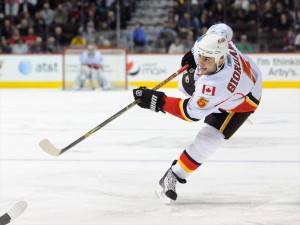The Calgary Flames have had a miraculous 2014-15 season. Pegged by most analysts to be among the National Hockey League’s worst teams and projected to fall to the bottom of the standings, the club has instead persevered and, at times, excelled. As the team approached the trade deadline, the primary question was whether the club would attempt to add to their group in anticipation of a playoff push

And then Mark Giordano tore his bicep in the final minute of a game in New Jersey, and everything changed.
Expectations for the playoffs evaporated among the Flames fan-base, and the main question was how the team would replace Giordano’s stellar play and leadership. In their first eight games without their best player, the Flames went 5-2-1.
BEFORE
Mark Giordano – T.J. Brodie
Kris Russell – Dennis Wideman
Ladislav Smid (later Raphael Diaz) – Deryk Engelland
The majority of the even-strength time was split up fairly evenly between the top two pairings. Mark Giordano and T.J. Brodie primarily started shifts in the defensive zone against top-line opposition. Kris Russell and Dennis Wideman primarily started shifts in the offensive end against secondary opposition. Ladislav Smid and Deryk Engelland got the left-over shifts, playing a mixture of selected shifts when the other two pairings were being rested. When Smid went down with an injury in January, Raphael Diaz came in for him.
When you factor in special teams time, Giordano and Brodie got slightly more ice-time than Russell and Wideman, and the third pairing got significantly less time than they did.
The left-shooting Brodie and the right-shooting Diaz generally played on their opposite sides because of their partners.
AFTER
Kris Russell – Dennis Wideman
T.J. Brodie – Deryk Engelland
David Schlemko – Raphael Diaz
The lack of Mark Giordano basically throws a monkey wrench into everything. Since Russell and Wideman showed the ability to play well together, they’re kept together and their ice-time is ratcheted up. However, their quality of competition is also bumped up and as a result, they’re ending up spending a lot more time in their own zone than before.
Likely in an effort to maintain some balance in the line-up, Brodie is paired with Deryk Engelland and actually plays a little bit less. Brodie maintains his primarily defensive-zone starts that he had with Giordano, but late in games typically rotates through both Engelland and Raphael Diaz. The third pairing basically gets the leftovers, which has the benefit of keeping Diaz relatively fresh for power-play situations and late game rotations with Brodie. (Corey Potter played in two games but barely factored into the line-up, playing seven minutes on average.)
Russell and Wideman are playing a lot more. Brodie is playing slightly less, while Engelland is playing a lot more. In other adjustments, Brodie moves back to the left side and Diaz moves back to the left side.
REPLACEMENT BY COMMITTEE
In comments to the media, Flames coach Bob Hartley noted that since Giordano’s such a big part of the team, they have to attempt to replace him by committee. Giordano played an average of 25 minutes per night. His minutes were distributed, in essence, like this:
- Wideman: 5 more minutes
- Russell: 5 more minutes
- Schlemko: 12 minutes
- Engelland: 4 more minutes
T.J. Brodie is actually playing slightly less on-average (by about a minute or so) than he was previously.
IS IT WORKING?
It’s hard to say that it’s working, as you can’t just replace a Norris contender. But considering the Flames have a winning record without him thus far, the plan appears to be working.